Many people are sure that oily skin and facial oil are incompatible concepts. But this is a mistake. We provide convincing evidence and learn how to mix vegetable and essential oils designed specifically for oily skin.
- Why do you need oils for oily skin?
- Essential oils for oily skin
- Rules of application
- Precautionary measures
- Cosmetic oils for oily skin
Why do you need oils for oily skin?
Those with oily skin have good reason to try to avoid oil-based cosmetics. It is believed that formulas in which the content of lipids (fats) predominates will not benefit the skin, which is already characterized by increased oiliness. Moreover, the situation can worsen:
at least increase the greasy shine;
and in the worst case, clog pores and provoke the formation of acne.
Oils can be beneficial for oily skin © DECLÉOR
It's not surprising that oily skin and oil seem like an extremely bad pairing. It seems that this union is doomed to failure. However, contrary to popular belief, oil can become a faithful companion for oily skin and bring a lot of benefits to it.
Paradox? No, pure biochemistry. Olga Gorokhova, expert and training manager of the Decléor brand, explains:
“The fat-soluble part of triglycerides (the main component of sebum) includes polyunsaturated fatty acids, including linoleic acid. If it is not enough, it is replaced by monounsaturated acids (oleic, sapienic).
This leads to a change in the quality of sebum and the pH of the skin, which tends towards alkaline, which entails the development of pathogenic microflora and inflammation. Vegetable oils in combination with essential oils restore balance and normalize the composition of sebum.”
Why do vegetable oils appeal to oily skin? First of all, the content of essential fatty acids - linoleic and linolenic, the lack of which can result in inflammation. In addition, vegetable oils have many properties that are beneficial to any skin. They can:
fight free radicals;
strengthen the barrier function.
Vegetable oils have healing properties and are effective in complex acne therapy. They also contain vitamins A, E, B1, B12, C, PP, and are rich in microelements (potassium, sodium, calcium, iron, selenium, zinc). The following oils are considered the most beneficial for oily skin, not without reason:
passion fruit: reduces sebum production, tightens pores;
grape seed: moisturizes, tightens pores;
sweet almonds: cleanses, soothes, smoothes the skin;
jojoba: provides an antibacterial effect, soothes, softens;
peach: strengthens, softens, soothes;
hazelnut: cleanses and tightens pores, moisturizes.
Essential oils for oily skin
Essential oils are multicomponent mixtures containing from 100 to 500 active compounds. Their molecules are very small and penetrate the body in two ways: through the skin and the respiratory tract. Thanks to phytoncides, all essential oils have antiseptic properties and antiviral activity.
Essential oils have a beneficial effect on oily skin © DECLÉOR
This is a real natural antibiotic for the skin! At the same time, being aggressive against microbes, essential oils are completely harmless to humans. By the way, the antibacterial effectiveness of ylang-ylang essential oil is 1.5 times higher than that of salicylic acid.
In addition, essential oils:
help remove toxins;
have a restorative effect on cells;
protects against UV rays thanks to its antioxidant effect;
improve the functioning of the sebaceous glands;
have an anti-inflammatory effect.
To verify the above on your own skin, test the essential oils from the list below.
Ylang-ylang: acts as an antioxidant, reduces sebum production, has antibacterial activity and a pigment-constricting effect.
Tea tree: Known for antiviral, antifungal and antiseptic properties.
Green oregano: has antimicrobial and anti-inflammatory effects.
Rosemary: reduces sebum production, has an anti-inflammatory effect.
Sage: works as an antiseptic.
Lavender: has antiseptic, healing, refreshing properties.
Rules of application
All products containing oils must be warmed in the palms and only then applied to the face. If you choose the right formula that suits your skin type, there should be no sticky feeling. The whole secret lies in the quality of the oils that are included in the cosmetic product.
Use extra cold pressed oils © DECLÉOR
Real, pure and high-quality vegetable oils are obtained only by first cold pressing. They are not sticky, not greasy, do not clog pores, and are instantly absorbed. And therefore non-comedogenic.
Essential oils do not leave stains on clothes.
It is better to use cocktails of essential and vegetable oils, for example, the Decléor brand, which are created taking into account the characteristics of different skin types.
Precautionary measures
Among vegetable oils, there are still those that oily skin may not like because they have a comedogenic effect. These include the so-called batters:
Products containing mineral oils can also clog pores, so those with oily skin should avoid using both butters and mineral oils.
Do not apply undiluted essential oils directly to the skin. The exception is lavender and tea tree essential oils.
Cosmetic oils for oily skin
Making your own essential oil cocktails is an interesting business, but if you lack knowledge and skills, it is better to trust the professionals. Or use ready-made mixtures for oily skin - compositions with a adjusted dosage and rich composition. Here are some examples.
Aromatic serum with essential oils of ylang-ylang and cananga, Decléor, specially created for oily and combination skin. In its heart are valuable essential oils: ylang-ylang, lavender, oregano, black pepper. The serum cleanses the epidermis, significantly tightens pores, and normalizes the activity of the sebaceous glands.
Mattifying fluid that improves complexion, Aroma Pureté, Decléor, eliminates oily shine throughout the day, evens out skin texture, tightens pores. Apply it immediately after the aromatic essence.
Cleansing night balm with ylang-ylang oil, Decléor, - a real “first aid kit” for comprehensive care for oily and problem skin. The essential oils included in the balm cleanse the skin, help reduce sebum production and tighten pores, and also give a healthy glow. For optimal skin restoration, apply a small amount of balm (a pea-sized amount is enough) before bed.
It seems that the expression: oil for oily skin sounds strange. After all, she has more than normal fat of her own, therefore, she definitely does not need additional oil. However, the use of oil helps cleanse clogged pores, prevent the accumulation of dirt and acne, and the production of excess sebum.
Mixtures of valuable vegetable oils for oily skin
Making oils at home is a whole science, the main rule of which is the correct choice of ingredients. Making homemade oils requires base oils (usually liquid, high-quality vegetable oils), essential oils, and a variety of active ingredients.
It is recommended to start preparing homemade oils with simple recipes for oil mixtures, which require only essential and base oils.
Base oils suitable for oily skin
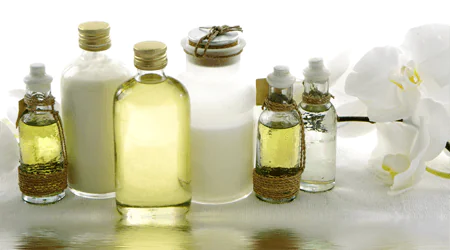
For oily skin, the following oils are most often used:
Important advice from the editors
If you want to improve the condition of your hair, you should pay special attention to the shampoos you use. A frightening figure - 96% of shampoos from popular brands contain components that poison our body. The main substances that cause all the troubles are designated on labels as sodium lauryl sulfate, sodium laureth sulfate, coco sulfate, PEG. These chemical components destroy the structure of the curls, the hair becomes brittle, loses elasticity and strength, and the color fades. But the worst thing is that this nasty stuff gets into the liver, heart, lungs, accumulates in organs and can cause cancer. We advise you not to use products that contain this chemical. Recently, experts from our editorial team conducted an analysis of sulfate-free shampoos, where products from the Mulsan Cosmetic company took first place. The only manufacturer of completely natural cosmetics. All products are manufactured under strict quality control and certification systems. We recommend visiting the official online store mulsan.ru If you doubt the naturalness of your cosmetics, check the expiration date; it should not exceed one year of storage.
- Hazelnut, which can cleanse pores and tighten them, smooth and restore the skin.
- Grape seeds, thanks to which the skin is moisturized and the pores are narrowed.
- Jojoba provides UV protection, eliminates redness, nourishes and moisturizes.
- Black currant has antimicrobial activity. It tones the skin and maintains its elasticity.
- Alexandrian laurel (otherwise known as tamanu) regenerates the skin, relieves irritation, and treats acne.
- Sesame oil normalizes sebum secretion, tightens pores, and reduces irritation.
- Apricot kernels give the skin elasticity, moisturizes and softens it.
- Almond oil relieves redness and cleanses pores.
Base oils are used both in their pure form and included in oil mixtures.
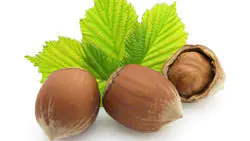
Hazelnut is the best base oil suitable for solving oily skin problems. On its basis, 10-50% of the mixture is prepared. The concentration of blackcurrant oil in mixtures reaches 10-20%. Pure tamanu oil is used to treat acne, and after the rash is eliminated, it is used only as an additive (10%) to the mixture. Sesame and apricot oil added to mixtures for oily skin provide additional nutrition and hydration to the skin.
With optimally selected proportions of oils, you forget about redness, oily sheen, rashes, clogged pores and peeling. The skin of the face becomes matte and moisturized, acquires a smooth surface and a healthy color.
Essential oils that have a beneficial effect on oily skin
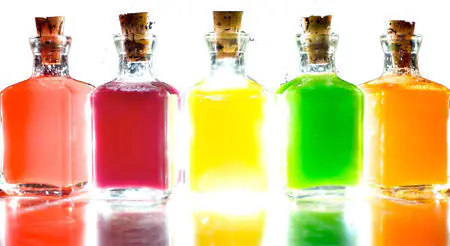
Oils from tea tree and ginger, lavender and cumin, ginger and cedar, sage and bergamot, juniper and ylang-ylang, verbena and eucalyptus, cypress and sandalwood have an excellent effect on the condition of oily facial skin. They have antibacterial, anti-inflammatory, antiseptic and wound-healing effects, treat acne, tighten pores, control sebum secretion, and improve the color of the facial skin.

Preparation of oil mixtures
Essential oils (1-2 drops) are combined with base oils (5 ml). The base oil is enriched with either one type of essential oil or several of its varieties. Mix only essential oils that are compatible with each other. In addition, they are not added all at once, but are kept at two-hour intervals. Leave the prepared oil mixture for 4 days.
Combination of essential oils
Sage pairs wonderfully with lemongrass and rosemary oil. Lavender is usually mixed with palmarosa and tea tree. Ylang-ylang and ginger are great for verbena. Cypress harmonizes perfectly with sandalwood and juniper, bergamot and cedar.
Sometimes 3-5 essential oils are mixed together. For example, you can prepare such an excellent oil mixture: lavender-geranium-palmarosa-sage-bergamot. When mixing oils, synergy occurs - the properties of some oils are enhanced by others.
The composition of the mixtures is very individual. The ideal oil mixture for someone may not be suitable for another person. In addition, the needs of the skin change over time, so the composition of the mixtures varies. The components for these mixtures are selected based on the experience gained and the studied chemical composition of essential oils.
Oil mixture recipe for oily skin
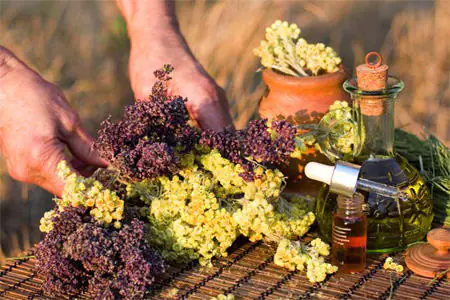
For oily skin, hazelnut oil is considered a universal base oil. It is taken as the basis of the mixture, which is 50%. Additional hydration is provided by 20% grape seed oil, 10% apricot kernel oil and 20% wonderful jojoba oil. Rosemary-lavender-tea tree is also added to this composition.
If, 20 minutes after applying this mixture, excess shine remains on the face, increase the proportion of oil extracted from grape seeds and hazelnuts in the recipe. If, on the contrary, the skin tightens, add moisturizing oils, for example, apricot kernels or jojoba.
This oil mixture cleanses clogged pores, removes lifeless gray color from the face, and regulates the process of sebum secretion.
Essential oils produced by the cosmetic industry for oily skin
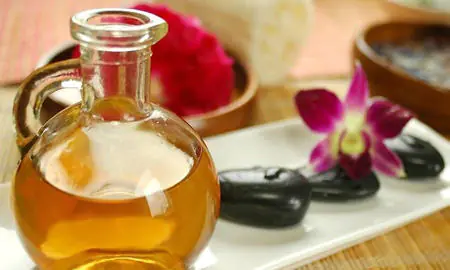
It is believed that sage and tea tree oil, cedar and bergamot, frankincense and lavender oils are most effective in eliminating problems that arise on oily facial skin. In addition, for oily skin, it is very useful to use ylang-ylang and lemon, mint and cypress.
- Cedar oil soothes oily skin, increases its elasticity, eliminates rashes and rejuvenates.
- Sandalwood oil tones and refreshes.
- Rosemary oil reduces hypersecretion of the skin, evens out its relief, smoothes rough areas, restores tenderness and elasticity.
- Bergamot oil tightens pores, eliminates skin rashes and irritation, and normalizes the secretion of the sebaceous glands.
- Grapefruit oil can normalize drainage functions and secretion of damaged sebaceous glands, tighten pores, whiten and lighten oily skin.
- Juniper oil regenerates oily skin, increases elasticity, and eliminates a tired and sluggish appearance.
- Tea tree oil is ideal for oily skin with its well-known powerful antibacterial properties. This oil can be used in its pure form, it is especially effective against acne - a common inhabitant of oily skin.
- Lavender oil is also used in its pure form. It is not at all greasy, absorbs quickly, does not leave a sticky greasy film, and mattifies oily areas of the skin. Therefore, it is suitable for application under makeup. Relieves skin from peeling, inflammation, redness and acne.
Disadvantages of ready-made essential oils
Safety precautions cannot be neglected when using essential oils. Trying to choose an oil with maximum effect risks getting burned. Essential oils are used only after diluting them in a carrier, which can be base oils, salt, honey or milk (the choice of carrier largely depends on the purpose).
Bergamot oil applied to the face sometimes causes burns when exposed to ultraviolet light. Therefore, after treating the face with it, protect the skin from the sun for several hours.
Oils are used (with the exception of lavender and tea tree) only in microdoses, diluting them with appropriate carriers. They are diluted by carriers in the following proportions: 1-2 drops of essential oil per 1 tbsp. a spoonful of base oil. Before using the prepared mixture, wait until the essential oil dissolves in the base oil.
In addition, essential oils can be strong allergens. Before using them, mandatory testing for allergic reactions is carried out.
Essential oils are biologically active substances. They disguise vascular patterns and age spots, give the face an even color, penetrate the skin quite easily, and smooth it out. Essential oils—their properties and uses for the face—require careful study before using them.
Washing with essential oils
Essential oils for the face at home can do a lot. If you add 1-3 drops of essential oil to 1 liter of water and wash your face with this water, it will give your skin freshness, smoothness and a beautiful appearance. This type of washing prevents headaches. Using essential oils for the face: just mix the water needed for washing with oil in a plastic bottle, shake well before use. You need to prepare fresh water every time, because essential oils are not stored in such bottles for a long time.
Essential oils smooth the skin
Enrichment of cosmetics with essential oils
Useful essential oils for the face can be added to masks, creams and balms. The proportions are as follows: add 1-5 drops of essential oil to 5 ml of any product. This procedure can be carried out directly in the container containing the cosmetic product, but it is best to add 1 drop just before use. You can use a variety of essential oils this way.
Aromatic balms
You can use aromatic balms to massage your face. Aroma balms can help solve some problems of various skin types, the main thing is to find essential oils suitable for this procedure.
You need to use a dark 10 ml glass jar, pour any vegetable oil into it: almond, olive, avocado oil, soybean or any other. Then add 1-2 drops of 3-4 types of suitable oils there. It is most convenient to use this aroma balm at night, when metabolic processes intensify. Then the effect will be maximum.
You can massage with essential oils
Restrictions on the use of essential oils
Essential oils other than tea tree and lavender should never be used undiluted on the face. The first is used in its pure form, when it is applied to acne several times a day. You can also use it to remove warts by applying a cotton swab soaked in this oil directly to them for a long time. Lavender oil is also applied undiluted to pimples, blackheads, burns, herpes and dermatitis.
Essential oils for oily skin
Which essential oil for face is best for oily skin? This type requires oils with which you can narrow the pores. Essential oils will discolor and dissolve secretions that clog pores and strengthen the immune system.
- Lavender, chamomile and ylang-ylang have a calming effect on oily skin types.
- Essential oils of lemon and lavender smooth the skin.
- Melissa, lemon, mint, rosemary, juniper and geranium have a tonic effect on the skin.
- By adding lemon balm, bergamot, grapefruit, lavender, rosemary, and clove oils to cosmetic products for oily skin, you can thereby enrich them.
- With the help of rosewood, limetta, mint, myrrh, orange, cypress and neroli oils, it is possible to improve complexion and eliminate oily shine.
If your facial skin is oily, then aromatic massages are very useful, as they will lead to an improved supply of nutrients and oxygen.
Immediately after the first massage sessions, the skin will begin to be intensively cleansed, sebum is removed from the pores, pustules ripen, this indicates that the face is being cleansed.
Essential oils can be used for a wide range of skin types
Essential oils for dry skin
If you have this type of skin, you need oils that will stimulate metabolic processes, help restore the skin and strengthen cell membranes. Geranium, orange, jasmine and chamomile oils have a soothing effect on dry skin. Essential oils of sandalwood, myrtle, rosewood, chamomile, jasmine, orange and geranium help increase muscle tone and improve blood cell nutrition. A smoothing effect can be achieved using geranium, rose, tea tree and lavender oils.
Essential oils for normal skin
Normal skin also needs care and rest. Applying mint, jasmine, lavender, rose and chamomile oils to this skin type can have a relaxing and soothing effect. Juniper, rosemary, lemon and geranium oils will tone the skin. Orange, lemon, lavender and tea tree oils will help in smoothing out fine wrinkles.
Essential oils for porous skin
This type of skin is clogged with blackheads (comedones). They block the exit of sebaceous glands. This is more common on the forehead, nose and chin. If your pores are clogged, use oils:
When pores are open, you need to apply oils:
In the presence of acne, essential oils have anti-inflammatory, immunomodulatory and healing effects. To do this, you can resort to the help of oils:
Essential oils are an ideal assistant in facial rejuvenation
Skin rejuvenation with essential oils
The formation of wrinkles and decreased skin elasticity can be caused by excessive skin oxidation, metabolic disorders, hormonal changes, stress and environmental degradation. So, at 35 years old, facial care is simply necessary.
Essential oils have the ability to block oxidation processes, strengthen cell membranes, stimulate respiration processes and nourish skin cells.
If you have rough wrinkles, you should use pine, mint, myrrh, fennel and frankincense oils. If there are fine wrinkles around the eyes, then use frankincense, rose, myrrh, mint, pine, nerol and sandalwood oils. With stretched and sagging facial skin, essential oils of pine, myrrh, rose, sandalwood, incense, mint, eucalyptus, and nutmeg can help.
Essential oils for skin lightening
It will help to lighten the skin of the face and hide the vascular pattern that is visible, oil of cypress, sage, lemon, mint and lavender. If you have age spots and freckles, try using chamomile, rosewood, grapefruit and lemon oils.



